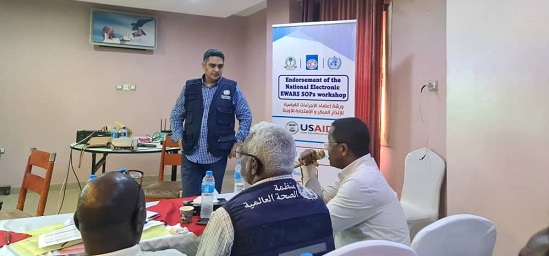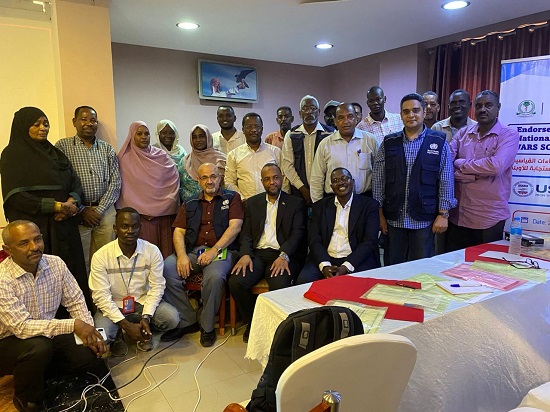
Port Sudan, 24 August 2023 – A 2-day endorsement and training-of-trainers workshop began on 23 August 2023 in Port Sudan by H.E. Minister of Health Dr Haitham Muhammed İbrahim Awadallah and WHO Representative Dr Nima Saeed Abid as part of the roll out of the WHO electronic Early Warning Alert and Response System (EWARS) in Sudan. The workshop aims to familiarize surveillance and response teams with the purpose, processes and implementation phases of the system, including roles of stakeholders, criteria for EWARS sites selection, standard case definitions, alert and outbreak thresholds and standard operating procedures for EWARS implementation. More than 60 participants from Federal and state ministries of health and WHO are physically attending the workshop and over 50 participants from partners, including United Nations agencies and international nongovernmental organizations are attending virtually.
EWARS is a simple and cost-effective way to set up a disease early warning and response system. It is designed to improve disease outbreak detection and response in emergency settings, such as in countries in conflict or following a natural disaster.
“With implementation of EWARS in Sudan, we are better equipped to respond quickly and effectively to disease outbreaks that could potentially become catastrophic in the midst of the ongoing humanitarian crisis,” said Dr Nima Saeed Abid, WHO Representative in Sudan. Dr Abid further reaffirmed WHO’s commitment to continue providing technical support to Sudan’s Federal and state ministries of health to strengthen disease surveillance.
Humanitarian emergencies increase the risk of occurrence and transmission of infectious diseases outbreaks and other health conditions such as severe malnutrition. An effective disease early warning and response system is essential to detecting and responding to disease outbreaks quickly before they spread, cost lives and become difficult to control.
H.E. Dr Haitham Muhammed İbrahim Awadallah commended the emergency surveillance team's contributions and their vigilant monitoring of the evolving epidemiological landscape. He also expressed his sincere appreciation of WHO’s unwavering support of the Federal Ministry of Health in its delivery of health to the people of Sudan.
More than 4 months of conflict has left Sudan reeling with an unprecedented humanitarian crisis that has stretched the health system to its limit. Displacement, insecurity and lack of resources has disrupted the disease surveillance system. Designed to enable early detection in fragile, conflict-affected and vulnerable contexts and countries experiencing health emergencies, EWARS will allow the Sudan’s health system to detect and respond to outbreaks early.
Suspected outbreaks of malaria, dengue, measles, rubella, pertussis and acute watery diarrhoea are ongoing in Sudan, with limited capacity to detect and confirm suspected cases. WHO and health partners are working with Federal and state ministries of health to respond to these disease outbreaks.
The endorsement and ToT workshop on the Sudan electronic EWARS platform was conducted with the financial support of USAID’s Bureau of Humanitarian Assistance (BHA).

###


